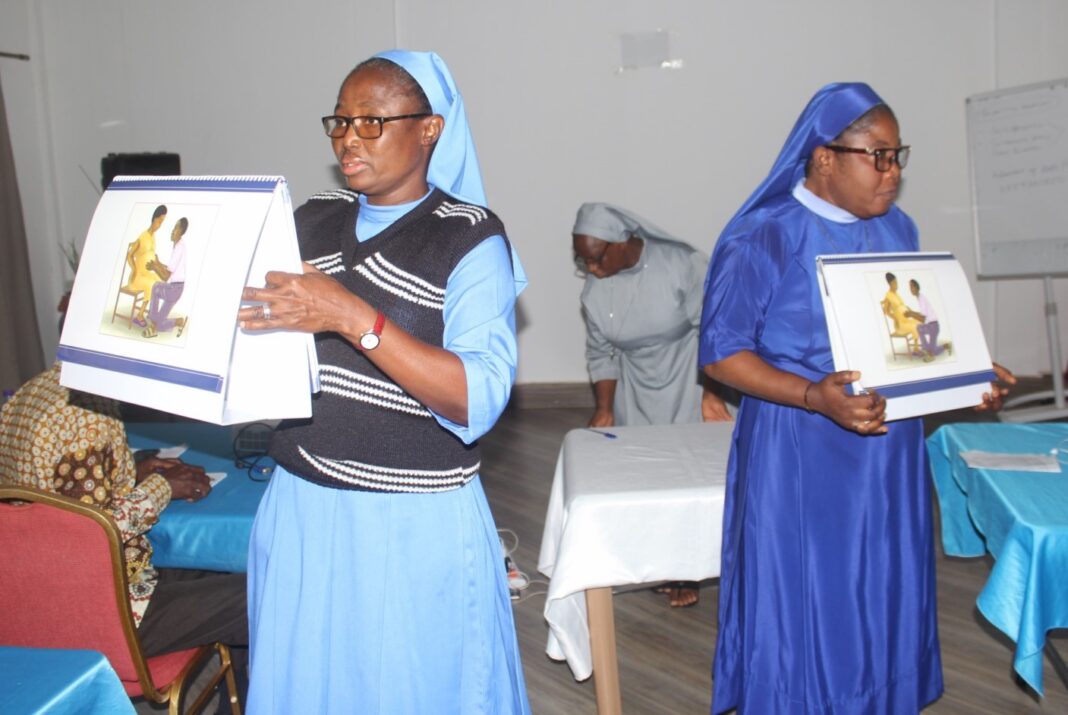A Catholic Nun who is a Midwife at Good Shepherd Health Centre at Tuna in the Catholic Diocese of Damongo in the Savannah Region has appealed to husbands to demonstrate extra love and concern to their wives when they are pregnant.
“You can do so by accompanying your pregnant wives to the antenatal clinic, assist them to perform stressful chores, among others,” Sr. Agatha Chiamaka, said at a training workshop on Simple Measurement of Indicators for Learning and Evidence-based Reporting (SMILER) at the Global Dream Hotel in Tamale.
Eighteen master trainers who are women Religious and twenty-one Community Health Volunteers attended the workshop from June 27 to July 1, 2022.
As part of the training workshop, Sr. Chiamaka exposed participants to practical skills in the use of flipcharts during which they were sensitized on the benefits of pregnant women regularly attending antenatal clinic, danger signs in pregnancy, dietary needs and other related issues.
As one of the resource persons, she advised pregnant women to eat high nutrients, have enough rest and take their personal hygiene seriously.
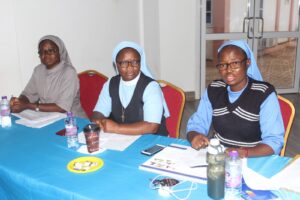
The Catholic Nun, however, cautioned them to avoid intake of alcohol, energy drinks, smoking and self-medication as these could affect their health and that of their unborn babies.
SMILER is a participatory process that enables teams to develop Monitoring, Evaluation, Accountability and Learning (MEAL) systems that are responsive to context and contribute to adaptive programme management.
It formed part of a project on Early Childhood Development programme dubbed, “Strengthening the Capacity of Women Religious (SCORE ECD III)” which is being implemented by eight Congregations in ten districts (towns) on a pilot basis.
The Catholic Relief Services (CRS) organised the workshop aimed to equip participants with skills in MEAL which plays a critical role in program quality and impact and thus provide them with the requisite knowledge to respond to stakeholder information needs, inform strategic programme design, adaptive management as well as develop quality MEAL systems to collect reliable and timely data.
Mr. Daniel Zakaria Yakubu, Coordinator of MEAL and Madam Safiatu Abukakr Bibilazu, Senior Project Officer of MEAL, both from CRS, were part of the Resource Persons. As key actors in the implementation of SMILER, participants during the workshop finalised data collection forms and implementation action plans associated with rolling out the MEAL system.
They also reflected on the MEAL system to identify and address gaps in quality or utility and reviewed the Project’s theory of change, results framework, the MEAL Plan, Indicator Performance Tracking Table and targets, stakeholder and communication plans, learning agenda, as well as feedback, complaints and response mechanism, data flow, data collection and reporting forms, instruction sheets and the SCORE III baseline results.
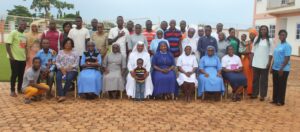
Madam Bibilazu entreated participants to understand the project theory of change, result framework, performance measurement indicators, stakeholder information needs and application of the data collection forms to ensure the success of the project.
She also advised them to establish functional accountability mechanisms and the MEAL system for their respective Congregations.
Participants were also given a lecture and hands-on training on making toys, especially floppy balls and play dough by Madam Rolanda F. Apaabe, a Lecturer at the Basic Education Studies Department, Faculty of Education, University for Development Studies, which aids children to be creative and to improve on their cognitive skills by helping them to identify colours, objects and shapes, among others.
Mr. Sylvester Bukari from Expemential Social Marketing, a marketing firm, also took participants through the preparation and health benefits of “Koko Plus”, a nutrition supplement for infants which is said to prevent stunting and anaemia.
He emphasised that the product is safe and approved by the World Food Programme. He, however, stated that it is only meant for infants who are not more than two-years-old.
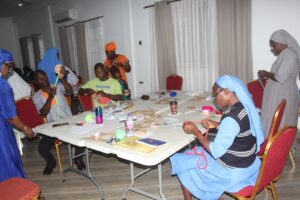
SCORE ECD III Project is being implemented by the Sisters of Mary Immaculate, Franciscan Missionaries of Mary, Daughters of Charity of St. Vincent de Paul, Daughters of Mary Mother of Mercy, Sisters of Charity of St. Anne, Sisters of Immaculate Heart of Mary Mother of Christ and Holy Spirit Missionary Sisters at Damongo, Walewale, Saboba, Tatale, Chereponi, Tuna, Chamba, Tinga, Kongo and Fumbisi.
Its overall goal is to ensure that children between the ages of 0-3 years in the targeted areas live in a nurturing environment by the end of 2024.
The Project which spans the period, December 2021 to November 2024, is funded by Conrad N. Hilton Foundation, a Philanthropic Trust based in the United States of America in partnership with CRS and implemented by the afore-named Congregations under the supervision of the Conference of Major Superiors of Religious in Ghana.
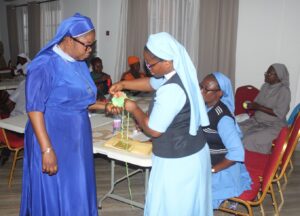
Source: Francis E. Monnie//Newswatchgh.com

